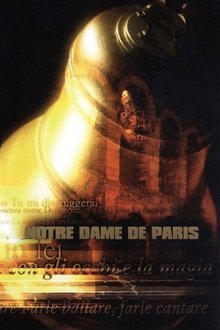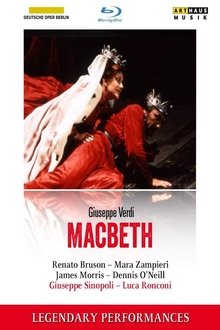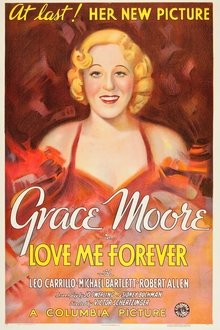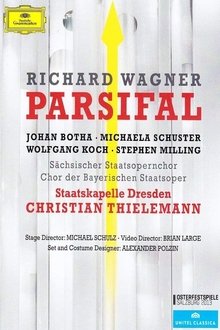First staged at the Teatro La Fenice in 1846, Verdi’s ninth opera, Attila, returns to the stage of La Scala on December 7th. Following the inauguration of the 2015-2016 Season with Giovanna d’Arco and in anticipation of Macbeth, with Attila Musical Director Riccardo Chailly continues his study of Verdi’s early works, renewing a successful collaboration with creative director Davide Livermore that began with his acclaimed production of Donizetti’s Don Pasquale for La Scala. In this complex opera Verdi experiments with fresh perspectives, featuring spectacular historical settings, introspective angles and moral uncertainties. Attila demands of its performers not only passion and confidence, but also the ability to find subtle accents and psychological nuances.
Related Movies

Vienna State Opera Presents Rossini’s Il Barbiere de Sivillia (2021)
A colorful and comedic staging of the classic opera buffa by the Vienna State Opera.

Rossini Sigismondo (2010)
Early Rossini has a youthful, buoyant vibrancy about it, even in the dark swirls of drammi per musica like Sigismondo. The work, centered on a mad king and his delusions, was rarely played after its premiere in 1814. This performance marked the first from the critical new edition at the 2010 Rossini Opera Festival in Pesaro and was hailed as a "perfect symbiosis of music and stage work" resulting in "truly brilliant theatre." Complete with a cast of sought-after Rossini singers, this is not to be missed.

Donizetti: La Fille du Régiment (2007)
In January 2007, superstar soprano Natalie Dessay, joined on stage by acclaimed tenor Juan Diego Florez dazzled British audiences in Laurent Pelly's new production of Donizetti's "LA FILLE DU REGIMENT". The perfectly staged & cast production became the operatic event of the year, receiving rave press reviews & rapturous audience ovations.

Rossini La Cenerentola (2008)
This is an excellent version of one of the greatest of all comic operas, featuring superb singing and orchestral playing. And it's not just the two headliners; listen, for example, to the entrance of the stepsisters at the beginning of Act One. Nevertheless, some viewers may find the staging problematic, with singers in clown-like costumes and sets featuring human-sized rodents. Those seeking a more conventional production might want to consider the Houston Grand Opera DVD, also on Decca, with Cecilia Bartoli and Raul Jimenez. Both sets are wonderful, but, for me, Joyce Didonato and Juan Diego Florez are slightly to be preferred. Highly recommended.

Rossini: La Donna del Lago (2015)
An all-star cast assembled for the Met’s first-ever performances of Rossini’s romantic retelling of Sir Walter Scott’s epic poem The Lady of the Lake. Joyce DiDonato is Elena, the title heroine, who is being pursued by not one, but two tenors—setting off sensational vocal fireworks. Juan Diego Flórez is King James V of Scotland, disguised as the humble Uberto, and John Osborn sings his political enemy, and rival in love, Rodrigo Di Dhu. Complicating matters is the fact that Elena herself loves Malcolm, a trouser role sung by mezzo-soprano Daniela Barcellona, and that she is the daughter of Duglas (Oren Gradus), another of the king’s political adversaries. Paul Curran’s atmospheric production is conducted by Michele Mariotti.

Amadeus (1984)
Disciplined Italian composer Antonio Salieri becomes consumed by jealousy and resentment towards the hedonistic and remarkably talented young Viennese composer Wolfgang Amadeus Mozart.

Notre Dame de Paris - Live Arena di Verona (2002)
Notre Dame de Paris tells the story of Quasimodo, the hunchbacked bell-ringer of the cathedral of Notre-Dame and of his impossible and tragic love for Esmeralda, a beautiful gypsy. A love condemned by injustice and hypocrisy. Quasimodo forced by his ugliness to look at the world from the top of a tower one day he falls madly in love with Esmeralda who sees dancing and singing on the square in front of the cathedral. But Esmeralda is in love with Febo, the handsome captain of the King's guards. Febo is fiancé of Fiordaliso, a young and rich bourgeois, but the exotic and sensual beauty of the gypsy does not leave indifferent the man who immediately falls in love with her. Even Frollo, the archdeacon of the cathedral, is attracted by the gypsy and spying on the moves of the two lovers in a raptus of jealousy and repressed carnal desire to get rid of the rival stabbing Febo behind.

Verdi: Macbeth (1987)
Macbeth" was Giuseppe Verdi's first attempt at music drama and also the first manifestation of his profound love for Shakespeare's work. Verdi took great pains with this opera, displaying special enthusiasm for it as he concentrated on the main characters of Lady Macbeth, Macbeth and the witches. This recording of Luca Ronconi's production is conducted by Giuseppe Sinopoli, who brings fresh color to Verdi's score. The cast, headed by Renato Bruson and Mara Zampieri, are strongly supported by a fine-toned and adaptable chorus who ably meet the demands of Verdi's great "chorus opera.

Love Me Forever (1935)
A man who loves an aspiring opera singer is prepared to sacrifice everything to help her with her career, even though he knows she doesn't love him.

Eine Nacht in Venedig (2015)
The delightful light operatic farce by Johann Strauss is presented at the Morbisch Lake Festival (Seefestspiele Mörbisch) starring Herbert Lippert, Richard Samek, Heinz Zednik and Dagmar Schellenberger.

The Metropolitan Opera: Otello (2012)
In Verdi’s retelling of Shakespeare’s towering tragedy, Renée Fleming gives a captivating performance as the innocent Desdemona, a role long considered one of her calling cards. Johan Botha as the title hero delivers an imposing portrayal of a proud warrior brought down by jealousy, and Falk Struckmann is thrilling as the villainous Iago. James Morris sings Lodovico. Elijah Moshinsky’s production is conducted by Semyon Bychkov.

Der fliegende Holländer (2022)
This is a performance of Wagner's three-act opera Der fliegende Holländer ("The flying Dutchman"), performed by Bayreuther Festpiele, directed by Dmitri Tcherniakov. The staging was notable for two other milestones, as Oksana Lyniv became the first woman to conduct at Richard Wagner’s legendary Festspielhaus since its opening in 1876, and the sensational Lithuanian soprano Asmik Grigorian made her house debut with a standout performance as the opera’s heroine, Senta. The exceptional cast also included John Lundgren (The Dutchman), Georg Zeppenfeld (Daland), Eric Cutler (Erik) and Marina Prudenskaya (Mary).

Tosca (2019)
Anja Harteros excels in the title role of Michael Sturminger’s cinematic staging of Puccini’s “Tosca”, the centrepiece of Salzburg Easter Festival. Aleksandrs Antoņenko compellingly portrays Cavaradossi, while Ludovic Tézier is a thrillingly malevolent Scarpia. Christian Thielemann leads the Staatskapelle Dresden. “Tosca” is a political thriller with a heart-breaking love story that gives a vivid account of the harassment of artists, political persecution, torture and arbitrary executions. In Salzburg it is set in the Mafiosi world of modern day Rome and is “the perfect thriller … reminiscent of Scorsese’s ‘Goodfellas’” (Kleine Zeitung), a “film noir”

Hadrian (2020)
Rufus Wainwright's original opera finds Emperor Hadrian devastated after his lover Antinous drowns in the Nile River. While matters of state encroach on his grief, and advisors clamour for war against a radical new threat to the Empire, Hadrian slips out of time to re-encounter the vision and reality of Antinous—and learn the truth about what happened on the Nile.

Mefistofele (2013)
The season kicks off with Boitos resplendent retelling of Goethes Faust, a monumental work of 'choral grandeur and melodic richness' (The New York Times) in one of the most impressive productions ever seen at the War Memorial Opera House. The cast includes Ramón Vargas, a tenor 'in ravishing voice' (Financial Times), as the philosopher who sells his soul to the Devil; the 'luminous, compelling' Patricia Racette (Washington Post) as the woman he desires; and, in the vividly menacing title role, the 'seductively malevolent' bass-baritone Ildar Abdrazakov, a 'fullbodied bass-baritone' renowned for his 'wonderfully evil portrayals' (The New York Times).

Leonard Bernstein Centennial Celebration at Tanglewood (2018)
In honor of Leonard Bernstein’s 100th birthday, Tanglewood—the famed summer home of the Boston Symphony Orchestra—dedicated its entire 2018 season to the iconic composer, conductor, performer, educator and humanitarian. The festivities culminated on Bernstein’s centennial birthday on August 25, 2018, in a special celebrity-studded gala concert. Directed for the stage by James Darrah, The Bernstein Centennial Celebration at Tanglewood illuminates the breadth of Bernstein’s incredible life and career, which inspired generations of music lovers around the globe – from his talent as a composer to his generosity in mentoring other composers and musicians, his inimitable role as a driving musical force at Tanglewood for over 50 years and more.

Parsifal live at the Salzburg Easter Festival (2013)
Christian Thielemann conducts the Staatskapelle Dresden in this performance of Wagner's opera recorded live in 2013. The performance was held for the Salzburg Easter Festival and featured vocalists including Johan Botha, Michaela Schuster, Stephen Milling and Wolfgang Koch.

Ariadne Auf Naxos (2012)
Christian Thielemann conducts this Staatskapelle Dresden production of Richard Strauss' chamber opera. The opera follows events at the home of the wealthiest man in Vienna, who has booked both a comedy burlesque act and a serious opera group for entertainment. When the dinner runs long he declares that both forms of entertainment must take place at the same time - much to the chagrin of the opera's proud young composer. Filmed live in Baden-Baden on Feb. 25 by the veteran director Brian Large, Renée Fleming makes her debut in the role of Ariadne together with fellow key Strauss interpreters Sophie Koch and Christian Thielemann, following on from their Rosenkavalier triumph. Thielemann conducts the Staatskapelle Dresden, the orchestra to whom Strauss dedicated his Alpine Symphony and which premiered Feuersnot, Salome, Elektra, Der Rosenkavalier and Daphne.

